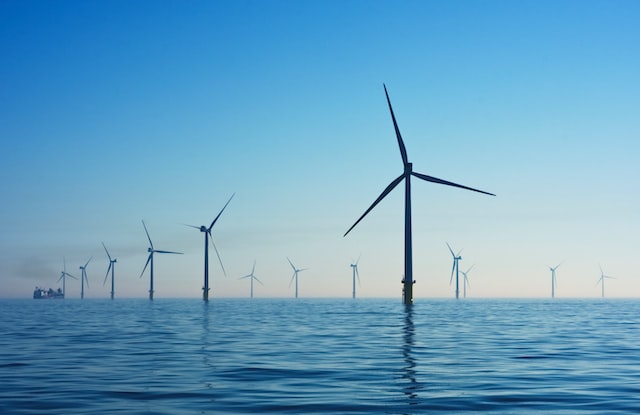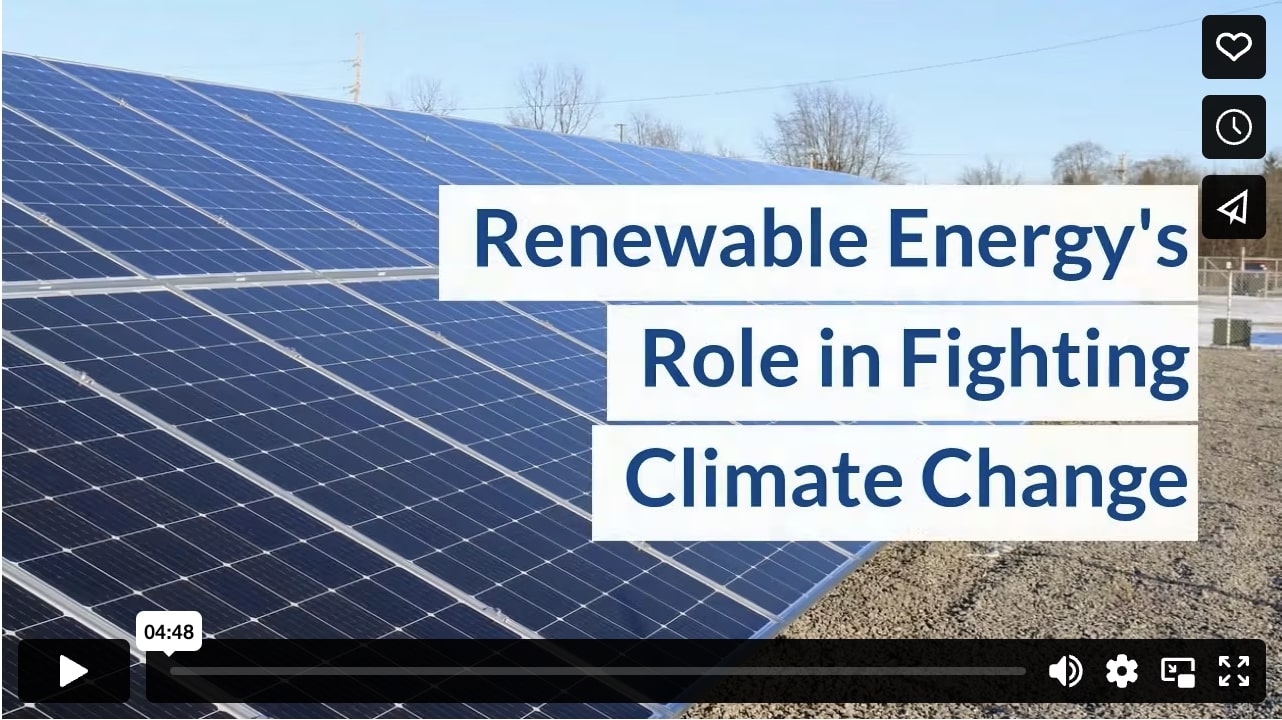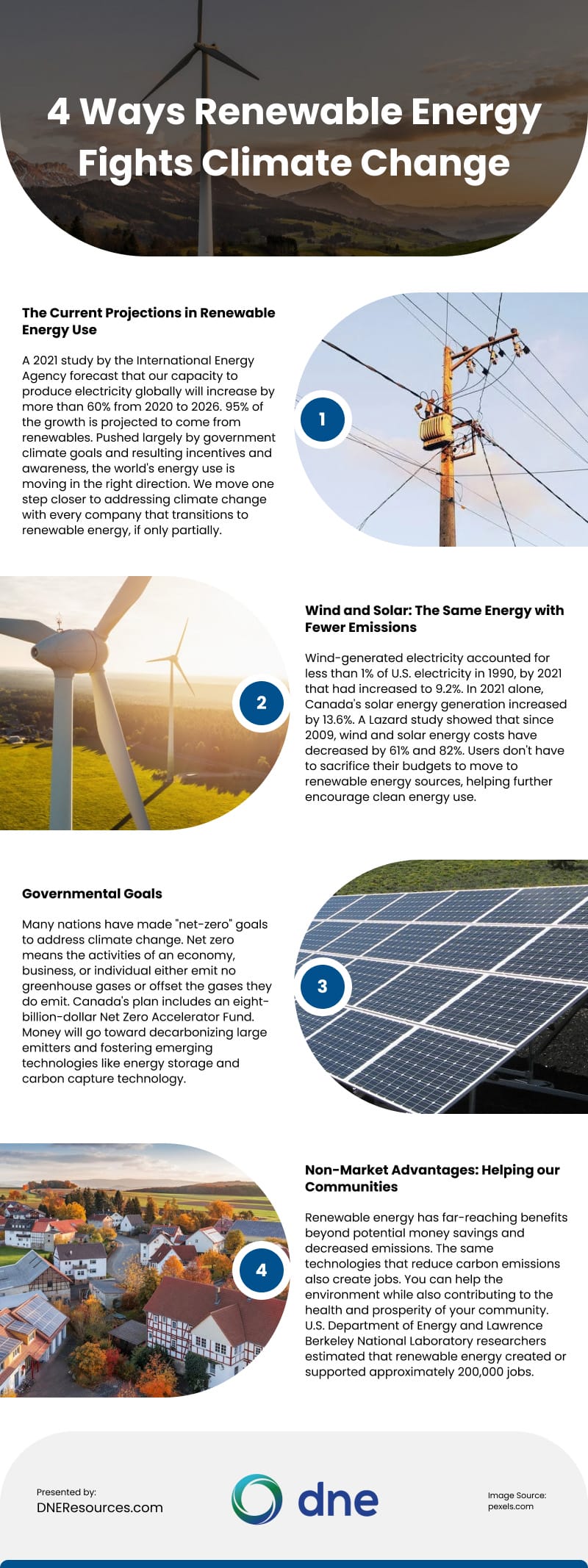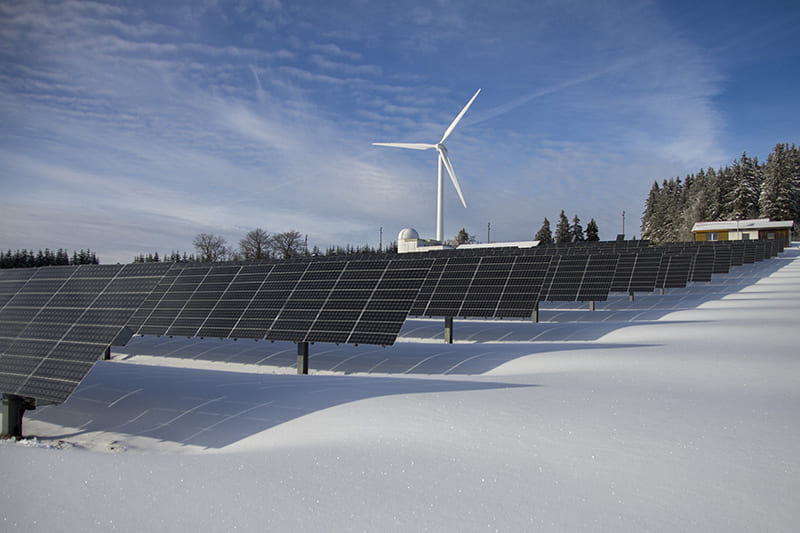
Climate change is becoming more and more apparent as we see its impacts in the form of droughts, rising sea levels, wildfires, and severe storms. It is severely impacting humanity, and projections show it will continue to worsen. Thankfully, there are multiple changes we can make to slow and perhaps eventually stop or reverse climate change. One of our most effective tools to do that is renewable energy.
The current projections for renewable energy use
There is still a long way to go before we end the emissions that cause climate change. Nevertheless, we are making progress.
A 2021 study by the International Energy Agency (IEA) forecast that our capacity to produce electricity globally will increase by more than 60% from 2020 to 2026. 95% of the growth is projected to come from renewables. Solar Photovoltaic (PV) alone will provide more than half that growth, and forecasts predict offshore wind capacity will more than triple by 2026.
These conclusions show that while the world’s overall energy consumption is growing, our ability to provide for our energy needs using renewable sources is increasing as well. Pushed largely by government climate goals and resulting incentives and awareness, the world’s energy use is moving in the right direction. We move one step closer to addressing climate change with every company that transitions to renewable energy, if only partially.
Wind and solar: the same energy with fewer emissions
In terms of cost, efficiency, and adoption, the 21st century has seen exceptional improvements in wind and solar energy. In the United States, wind-generated electricity accounted for less than 1% of electricity in 1990. By 2021 that had increased to 9.2%. In 2021 alone, Canada’s solar energy generation increased by 13.6%.
Technological advancements and economies of scale are driving prices down, which creates momentum for even more users to embrace these renewable sources. That also means wind and solar are better able to compete with fossil fuels. A Lazard study showed that since 2009, wind and solar energy costs have decreased by 61% and 82%, respectively. Users don’t have to sacrifice their budgets to move to renewable energy sources, helping further encourage clean energy use.
Even without reducing their total energy use, businesses and consumers can reduce their environmental impact thanks largely to wind and solar power. If you are looking for ways to reduce your business’s carbon emissions, switching to energy generated by wind and solar can be a fantastic step toward a neutral carbon footprint. Renewable energy consulting firms can help you develop a plan to incorporate wind and solar energy sources into your energy procurement plan.
Governmental goals
Many nations have made “net-zero” goals to address climate change. Net zero means the activities of an economy, business, or individual either emit no greenhouse gases or offset the gases they do emit. Offsets can include everything from planting trees to using technology that captures carbon, preventing it from being released into the atmosphere.
Canada’s government and more than 120 other countries, including all the G7 nations, have committed to reaching net zero by 2050. Canada’s plan includes an eight-billion-dollar Net Zero Accelerator Fund. Money from the fund will go toward decarbonizing large emitters, transforming established industries, and fostering emerging technologies like energy storage and carbon capture technology. Investment at this scale is exactly what is required to see the dramatic changes we need to slow climate change.
As governments prioritize renewable energy and reduced emissions, they incentivize technological advancements that will slow climate change. Large-scale governmental support also speeds up the rate at which users adopt these technologies and make choices to prioritize renewable energy.
Non-market advantages: helping our communities
You can help the environment while also contributing to the health and prosperity of your community. Renewable energy has far-reaching benefits beyond potential money savings and decreased emissions, which makes them even more desirable.
The same technologies that reduce carbon emissions also create jobs. U.S. Department of Energy and Lawrence Berkeley National Laboratory researchers estimated that renewable energy created or supported approximately 200,000 jobs and resulted in improved air quality, leading to global health benefits valued at $5.2 billion. Renewable energy creates jobs and results in cleaner air, saving lives and health care funds. These second-order results of green energy further encourage its use, which will hopefully increase adoption rates and slow climate change.
Renewable energy is coming to the forefront of energy and climate change conversations. We are seeing progress in its adoption and acceleration in its growth, particularly as it becomes cheaper and easier to make the switch. If major nations are going to achieve net-zero goals by 2050, that progress needs to continue. To end and eventually reverse climate change, renewable energy must continue to be central to decisions made by governments, businesses, and individuals. With all of us playing our part, we can stop the increasing damage wrought by climate change.
Infographic
The increasingly evident consequences of climate change, including droughts, rising sea levels, wildfires, and severe storms, are detrimentally affecting humanity, and the situation is projected to worsen. However, there is hope as we have the opportunity to mitigate and potentially reverse climate change by embracing renewable energy as a vital solution.
Video

Others articles you might like
7 ways sustainability benefits your business
With everything from the news to water-cooler conversations revolving around climate change and the environment, it's no surprise busines...
6 February 2024Six advantages of green energy and microgeneration for companies
Most companies rely partly or entirely on non-renewable fuels, such as coal, oil, and natural gas, to heat and cool their facilities and to ...
9 January 2024Short-term vs long-term energy contracts: How to decide which is best for your business
Your electricity procurement can have a substantial impact on your business's bottom line, which means there’s a lot to consider when it'...
21 December 2023




